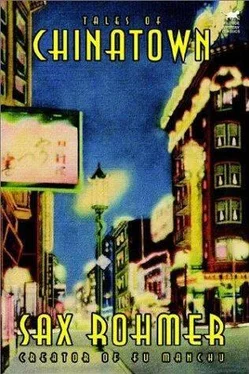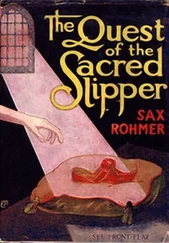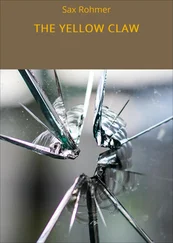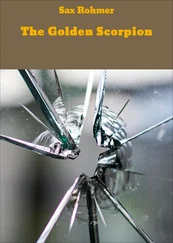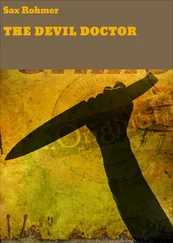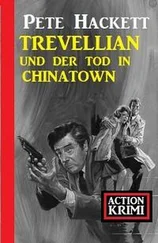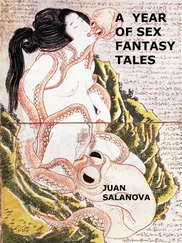The cab drew up before the house in Hamilton Place. We alighted, and Harley pressed the bell. The same footman whom I had seen admit the woman opened the door.
"Is Lady Ireton at home?" asked Harley.
As he uttered the name I literally held my breath. We had come to the house of Major Ragstaff's daughter, the Marchioness of Ireton, one of society's most celebrated and beautiful hostesses!-the wife of a peer famed alike as sportsman, soldier, and scholar.
"I believe she is dining at home, sir," said the man. "Shall I inquire?"
"Be good enough to do so," replied Harley, and gave him a card. "Inform her that I wish to return to her a handbag which she lost a few days ago."
The man ushered us into an anteroom opening off the lofty and rather gloomy hall, and as the door closed:
"Harley," I said in a stage whisper, "am I to believe--"
"Can you doubt it?" returned Harley with a grim smile.
A few moments later we were shown into a charmingly intimate little boudoir in which Lady Ireton was waiting to receive us. She was a strikingly handsome brunette, but to-night her face, which normally, I think, possessed rich colouring, was almost pallid, and there was a hunted look in her dark eyes which made me wish to be anywhere rather than where I found myself. Without preamble she rose and addressed Harley:
"I fail to understand your message, sir," she said, and I admired the imperious courage with which she faced him. "You say you have recovered a handbag which I had lost?"
Harley bowed, and from the pocket of his greatcoat took out a silken-tasselled bag.
"The one which you left in the Cafe Dame, Lady Ireton," he replied. "Here also I have"-from another pocket he drew out a diamond ring-"something which was extorted from you by the fellow Meyer."
Without touching her recovered property, Lady Ireton sank slowly down into the chair from which she had arisen, her gaze fixed as if hypnotically upon the speaker.
"My friend, Mr. Knox, is aware of all the circumstances," continued the latter, "but he is as anxious as I am to terminate this painful interview. I surmise that what occurred on Wednesday night was this-(correct me if I am wrong): While dining with Mr. De Lana you heard sounds of altercation in the street below. May I suggest that you recognized one of the voices?"
Lady Ireton, still staring straight before her at Harley, inclined her head in assent.
"I heard my father's voice," she said hoarsely.
"Quite so," he continued. "I am aware that Major Ragstaff is your father." He turned to me: "Do you recognize the touch of genius at last?" Then, again addressing Lady Ireton: "You naturally suggested to your companion that he should look out of the window in order to learn what was taking place. The next thing you knew was that he had fallen into the street below?"
Lady Ireton shuddered and raised her hands to her face.
"It is retribution," she whispered. "I have brought this ruin upon myself. But he does not deserve--"
Her voice faded into silence, and:
"You refer to your husband, Lord Ireton?" said Harley.
Lady Ireton nodded, and again recovering power of speech:
"It was to have been our last meeting," she said, looking up at Harley.
She shuddered, and her eyes blazed into sudden fierceness. Then, clenching her hands, she looked aside.
"Oh, God, the shame of this hour!" she whispered.
And I would have given much to have been spared the spectacle of this proud, erring woman's humiliation. But Paul Harley was scientifically remorseless. I could detect no pity in his glance.
"I would give my life willingly to spare my husband the knowledge of what has been," said Lady Ireton in a low, monotonous voice. "Three times I sent my maid to Meyer to recover my bag, but he demanded a price which even I could not pay. Now it is all discovered, and Harry will know."
"That, I fear, is unavoidable, Lady Ireton," declared Harley. "May I ask where Lord Ireton is at present?"
"He is in Africa after big game."
"H'm," said Harley, "in Africa, and after big game? I can offer you one consolation, Lady Ireton. In his own interests Meyer will stick to his first assertion that Mr. De Lana was dining alone."
A strange, horribly pathetic look came into the woman's haunted eyes.
"You-you-are not acting for--?" she began.
"I am acting for no one," replied Harley tersely. "Upon my friend's discretion you may rely as upon my own."
"Then why should he ever know?" she whispered.
"Why, indeed," murmured Harley, "since he is in Africa?"
As we descended the stair to the hall my friend paused and pointed to a life-sized oil painting by London's most fashionable portrait painter. It was that of a man in the uniform of a Guards officer, a dark man, slightly gray at the temples, his face very tanned as if by exposure to the sun.
"Having had no occasion for disguise when the portrait was painted," said Harley, "Lord Ireton appears here without the beard; and as he is not represented smiling one cannot see the gold tooth. But the painter, if anything, has accentuated the slanting eyes. You see, the fourth marquis-the present Lord Ireton's father-married one of the world-famous Yen Sun girls, daughters of the mandarin of that name by an Irish wife. Hence, the eyes. And hence--"
"But, Harley-it was murder!"
"Not within the meaning of the law, Knox. It was a recrudescence of Chinese humour! Lord Ireton is officially in Africa (and he went actually after 'big game'). The counsel is not born who could secure a conviction. We are somewhat late, but shall therefore have less difficulty in finding a table at Prince's."
"Examine it closely," said the man in the unusual caped overcoat. "It will repay examination."
I held the little object in the palm of my hand, bending forward over the marble-topped table and looking down at it with deep curiosity. The babel of tongues so characteristic of Malay Jack's, and that mingled odour of stale spirits, greasy humanity, tobacco, cheap perfume, and opium, which distinguish the establishment faded from my ken. A sense of loneliness came to me.
Perhaps I should say that it became complete. I had grown conscious of its approach at the very moment that the cadaverous white-haired man had addressed me. There was a quality in his steadfast gaze and in his oddly pitched deep voice which from the first had wrapped me about-as though he were cloaking me in his queer personality and withdrawing me from the common plane.
Having stared for some moments at the object in my palm, I touched it gingerly; whereupon my acquaintance laughed-a short bass laugh.
"It looks fragile," he said. "But have no fear. It is nearly as hard as a diamond."
Thus encouraged, I took the thing up between finger and thumb, and held it before my eyes. For long enough I looked at it, and looking, my wonder grew. I thought that here was the most wonderful example of the lapidary's art which I had ever met with, east or west.
It was a tiny pink rose, no larger than the nail of my little finger. Stalk and leaves were there, and golden pollen lay in its delicate heart. Each fairy-petal blushed with June fire; the frail leaves were exquisitely green. Withal it was as hard and unbendable as a thing of steel.
"Allow me," said the masterful voice.
A powerful lens was passed by my acquaintance. I regarded the rose through the glass, and thereupon I knew, beyond doubt, that there was something phenomenal about the gem-if gem it were. I could plainly trace the veins and texture of every petal.
I suppose I looked somewhat startled. Although, baldly stated, the fact may not seem calculated to affright, in reality there was something so weird about this unnatural bloom that I dropped it on the table. As I did so I uttered an exclamation; for in spite of the stranger's assurances on the point, I had by no means overcome my idea of the thing's fragility.
Читать дальше
